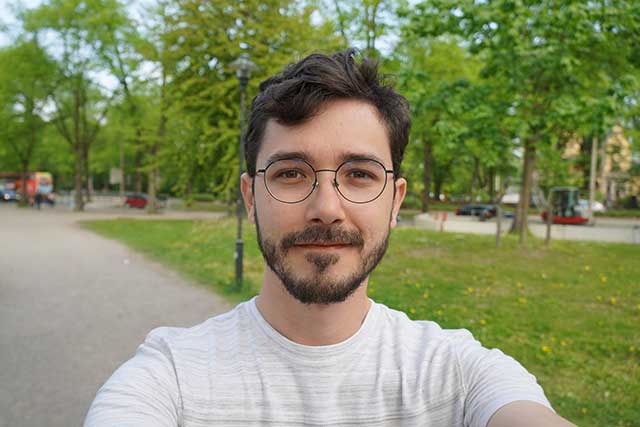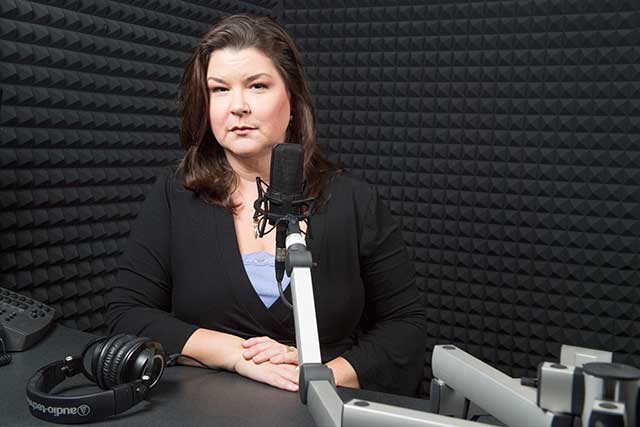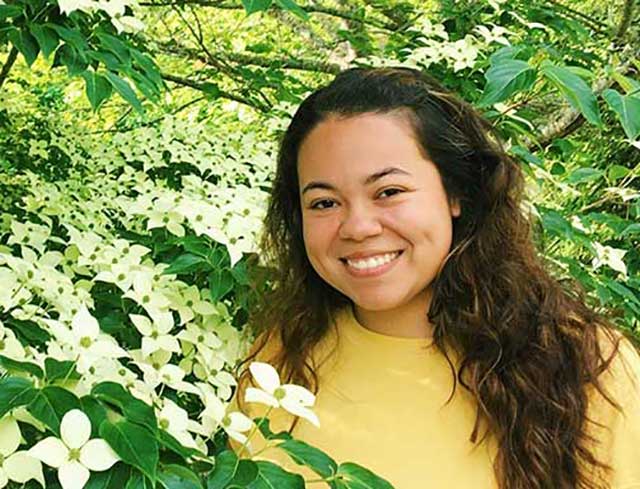As a member-supported service of Florida Gulf Coast University, WGCU provides programming that inspires, informs and engages the community, serving all or part of 12 counties in South and Southwest Florida. Most WGCU listeners, watchers or web users already know that. But they may not realize the symbiotic WGCU-FGCU relationship extends to providing the university’s student journalists with critical boots-on-the-ground experience reporting, writing and producing broadcast and digital news as WGCU interns — workplace exposure that adds a layer of eye-opening reality to journalism class concepts such as fairness, accuracy and ethics.
In fact, two Eagle journalists in training — spring graduate Victoria Alvarez and Class of 2019 alum Bruno Halpern — contributed to WGCU’s most recent collection of kudos: four Regional Edward R. Murrow Awards and eight first-place and two runner-up or “finalist” awards from the Florida Association of Broadcast Journalists (see sidebar below).
“I was super-surprised,” says Halpern, who won first place in the use-of-sound category among smaller radio stations for his report about a woman who hunts and kills invasive toads. “Doing that story was a powerful experience from start to finish.”

Not so surprised about his win was WGCU News Director Julie Glenn, who works closely with interns and contributed editing suggestions on Halpern’s piece. As he recorded his interview with the toad trapper, the woman spontaneously dove into a swimming pool in pursuit of one of the unwanted amphibians.
“He was rolling when she jumped in — it was hilarious,” Glenn recalls. “What he recorded was gold.”
Halpern’s golden opportunity came during a year in which he interned one semester at WGCU’s TV branch and the second on the radio side. Shortly after graduating with his second bachelor’s degree — his first, in marketing and communications, came from a university in his native Brazil — he was hired as a video editor at local news outlet NBC2, another longtime partner of FGCU’s journalism program.
Halpern and Alvarez’s success at WGCU was partly due to their eagerness to jump into reporting and storytelling, Glenn points out. Some interns are satisfied with simply rewriting news reports or media releases to be read on air, she says; others attracted by the prospect of being media stars don’t realize how hard broadcast journalists work.
Some of WGCU’s former go-getter FGCU interns eventually were hired full time and now help mentor Eagle interns themselves, including reporter/producer John Davis (2007 intern), producer Mike Kiniry (2003), social media and digital philanthropy manager Tara Calligan (2015). The skills Glenn and the rest of the team help interns develop include script writing and reading and audio editing. Sometimes, they sit in a studio going over a piece sentence by sentence, learning how to deliver a story better, to “talk past the mic.”

“They learn a lot if they want to,” says Glenn, who took the reins of the news department in 2017 as Hurricane Irma slammed Southwest Florida. “If they’re energetic and show they want to do it, they get stories right away. The whole team comes together to work with interns — not just me. Sometimes they work with John. Sometimes they get the opportunity to be on Gulf Coast Life.”
The FGCU-WGCU partnership is mutually beneficial, of course. The station’s small but prolific staff gains additional content as well as leads on potential sources and stories among the college set. Students gets pointers on producing portfolio-worthy work that could enhance their job prospects, but just as importantly they experience firsthand tenets of traditional journalism such as accuracy, balance and accountability. They may see reporter Andrea Perdomo, for instance, checking into the availability of coronavirus testing among Immokalee farm workers, to cite a recent example.
“These are kids raised in an era of news as opinion, news as entertainment,” Glenn says. “Having kids learn what real journalism is is really critical, and there’s no better place to learn that than public media. Old school journalism — it’s really important to teach that. Sticking up for the traditionally ignored voices in the community, holding people in power accountable. When you’re able to make something happen that needs to happen, like people being treated equitably, that’s what makes journalists want to keep doing what they do.”
Inclusivity is another journalistic value WGCU actively strives to uphold, as demonstrated by Alvarez’s sports story featuring a 60-year-old local woman who began training as a competitive fencer after a neurological disease left her paralyzed from the waist down. The piece was recognized in both the Murrow and the Florida Association of Broadcast Journalists awards.

“I liked how she framed it,” says Glenn. “It was like, ‘How does this person do this training?’ Not ‘Oh, this poor person.’ It really threaded nicely with our Move to Include project. We’re trying to do a lot more with people who have things like vision impairment or mobility issues.
“Victoria and Bruno got a lot of stories because they were energetic and excited. They stepped up and wanted to do stories. Victoria did at least 4 a month. I started to expect things of her.”
For her part, Alvarez credits the WGCU team for knowledge and experience she couldn’t have gained through traditional course work alone.
“Internships are so special for that reason,” she says. “You just can’t learn some things in the classroom like you can in the field. At WGCU, I learned that I was supported by the professionals there. They never limited me because I was a student. They treated me like I was a colleague, and for that I am appreciative. They trained me for the same reporting process they use, and this influenced the quality of work I learned to produce.”
Although Halpern’s diverse portfolio already included experience as an Eagle News editor and Eagle Radio host, and as a photographer, graphic designer, copywriter and screenwriter, he said working alongside professionals as an intern provided concrete experiential learning.
“In a classroom, listening to someone talk — it’s kind of abstract,” he says. “You have to go out and do reporting. Your actual sweat and effort really put into perspective the responsibilities that go with the job. You need an internship to know which lane of journalism you want to go into.”
With a year of local news experience in tow, Halpern is making something of a U-turn back to the university. He’s been admitted to FGCU’s graduate program in educational leadership.
“The professors I had in journalism were great,” he says. “Maybe I will follow in their footsteps and teach the next generation of journalists.”[/vc_column_text][vc_column_text]
Awards recognize WGCU staff’s achievements
The WGCU news team won four Regional Edward R. Murrow Awards from the Radio Television Digital News Association:
Excellence in Innovation: For WGCU News en Espanol, with reporter Andrea Perdomo.
Best Use of Sound: Andrea Perdomo, for Monitoring Poached Turtles Returned to the Wild.
Hard News: Andrea Perdomo, for Chinese Tariffs Dip into the Pocket of SWFL Nonprofit.
Sports: Victoria Alvarez, for SWFL Paralympic Fencer Trains for 2020 Tokyo Paralympic Games.
Regional Murrow Awards are presented to small and large radio, television and digital outlets based on 14 geographic regions. Award recipients move on to be judged at the national level, where winners will be announced later this year.
WGCU journalists also won awards this spring from the Florida Association of Broadcast Journalists: eight first-place awards and two runner-up or “finalist” awards in the radio market category for smaller stations.
First-place broadcast awards:
General Assignment/Long Form: Andrea Perdomo, for Monitoring Poached Turtles Returned to the Wild.
Use of Sound: Bruno Halpern, WGCU intern, and Julie Glenn, WGCU news director, for SWFL Woman Rids Town of Toads.
Feature Cultural: Andrea Perdomo, for Port Charlotte Muslims Celebrate the End of Ramadan.
Environmental Reporting Single Story: Andrea Perdomo, for Invasive Bacteria Threatens Florida’s Palm Trees.
Education Reporting: Andrea Perdomo, for Immokalee School Wins National Math Competition.
Feature Hard News: Andrea Perdomo, for Chinese Tariffs Dip Into the Pocket of SWFL Nonprofit.
Feature Light News: Julie Glenn, for Wolf Dog Goes Viral as Shy Wolf Sanctuary Seeks to Expand.
Finalist broadcast awards:
General Assignment: Julie Glenn, for Red Tide Returns: Fish Kills on Marco and Beach Warnings in Collier and South Lee Counties.
Sports: Victoria Alvarez, for SWFL Paralympic Fencer Trains for the 2020 Tokyo Paralympic Games.
Station of the Year in Community Service: The WGCU news team, for WGCU News en Espanol.
The recognition comes at a challenging time for journalists in general and the WGCU news team in particular. Before COVID-19 was even heard of, News Director Julie Glenn and her staff dealt with difficulties close to home.
“2019 was not an easy year in our newsroom as we had to adapt to my sporadic absences for health reasons, but this team stepped up without missing a beat,” according to Glenn, who says she is now “feeling good.” “They continued our award-winning tradition despite being short-staffed and having to communicate remotely with me during my absences, all of us unaware then that we were in training for COVID-related remote working conditions.”
“I’m not shocked that this team continues to provide such quality coverage of news that matters. Nor am I shocked that they are recognized for it by professional institutions. I am humbled that I get to be a part of it.”
—Dayna Harpster of WGCU Public Media contributed to this report.[/vc_column_text]